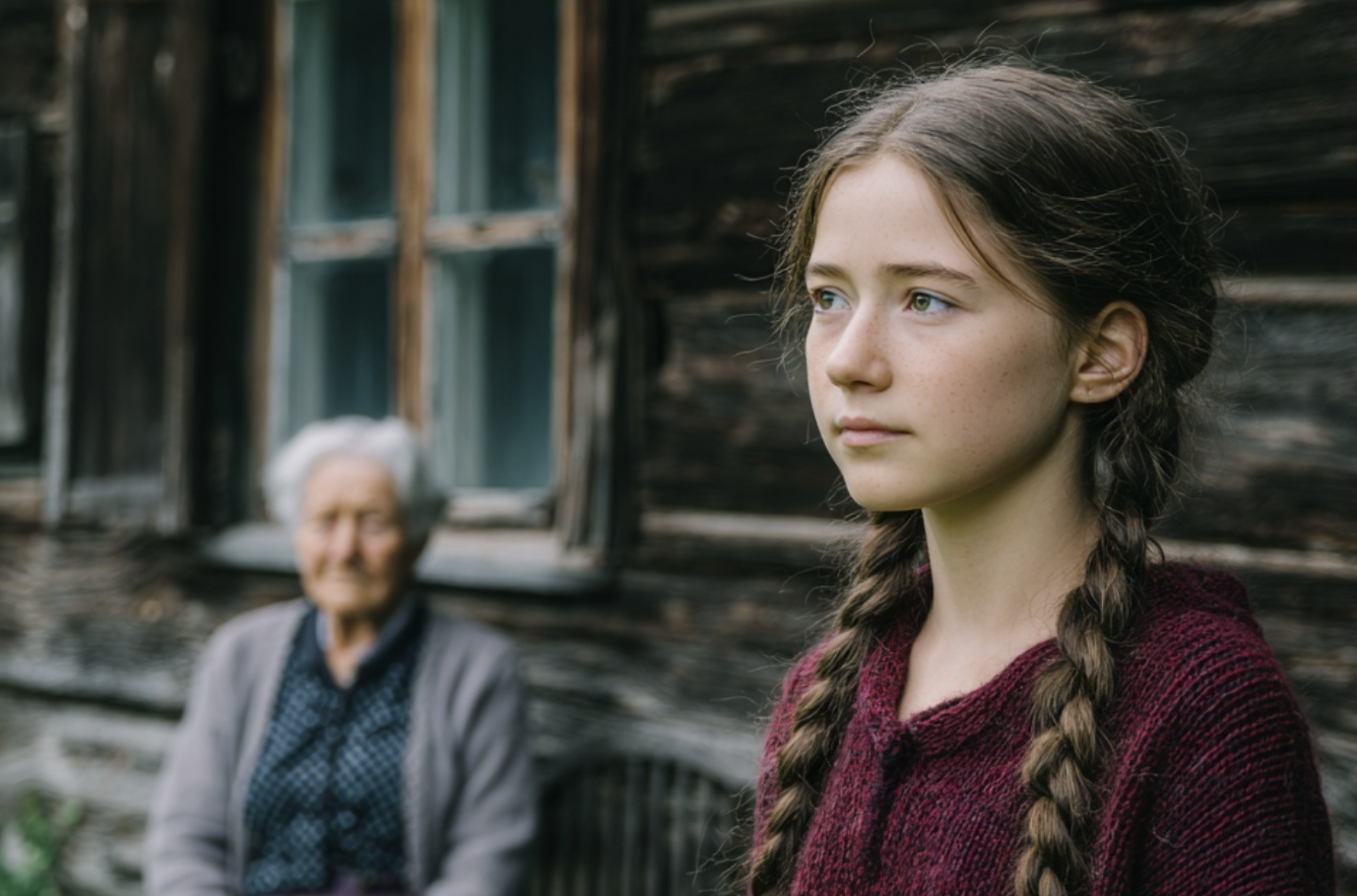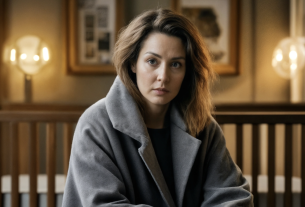It all began on the day the air turned thick and heavy, foretelling a storm. Into the stifling quiet of her little apartment, which smelled of tea and old paper, there burst an insistent knock at the door. On the threshold stood the postwoman, Klavdiya Ivanovna, and in her hands was not an ordinary envelope but a heavy cream one sealed with wax. Klavdiya Ivanovna handed it to Alisa with an unusual, almost funereal solemnity, as though she were passing not a letter but a heavy burden.
“For you, Alisa Viktorovna, personal delivery. From the notary’s office.” Unconcealed curiosity flickered in her eyes.
Alisa’s heart gave a start and then stopped, lying in wait for a blow. Her fingers, trembling slightly, tore open the fine envelope. Inside, on expensive paper with a watermark, in the dry, precise bureaucratic language of a lawyer, the notary Artyom Demidovich Marchenko informed her that she was required to appear for the reading of the will of the late Violetta Stanislavovna Belova.
Alisa read the letter three times, as if hoping the words would rearrange themselves into a different, less frightening meaning. A will? Violetta Stanislavovna? The very one whose funeral had thundered past a month ago, leaving behind a quiet, aching emptiness? They had never spoken of money or inheritance. Their relationship lived in a world of entirely different values: the whisper of turning pages, quiet evenings in a rocking chair, the scent of medicinal herbs, and conversations about the eternal. This official summons, this cold form, felt sacrilegious—a crude intrusion into the fragile world of her memories, into the quiet grief that still dwelled in every corner of her heart.
And now she sat in the cramped, stuffy office of the notary, saturated with the smell of old dusty files, cheap wood varnish, and strangers’ sharp, aggressive perfumes. She pressed herself into the hard chair by the wall, trying to take up as little space as possible, to become invisible, to dissolve into the faded patterned wallpaper. She alone here was an outsider, a small, accidental fish that had strayed into a school of predatory piranhas.
“Well, is this clerk going to start soon, or are we going to dry out here till evening?” whispered a stout woman in a screaming scarlet suit, loudly and with exaggerated distaste, flashing massive gold rings, any one of which could have fed Alisa for several months.
This was Eleonora Vitalyevna, a second cousin whom Alisa had seen perhaps three times in ten years, and each visit had been accompanied by a request for money—now for the cat’s treatment, now for urgent car repairs. Eleonora gave Alisa a measuring, contemptuous look, her painted lips twisting into a grimace that resembled a smile.
“And what are you doing here, dear? You won’t help Violetta Stanislavovna anymore with lozenges and cough syrup. This is serious—family business.”
Alisa flinched as if slapped and said nothing, only clutching more tightly at the handles of her battered leather handbag—Violetta’s gift for her last birthday. The notary walked in, a solid, imperturbable man in sober glasses. He cleared his throat to call for attention, and his cough cracked like the shot of a starting pistol.
“So then, dear attendees, let us begin,” he said in an even voice devoid of emotion—the voice of a man who grinds other people’s fates every day.
Eleonora Vitalyevna heaved a demonstrative sigh and adjusted her already perfect hairstyle.
“No need to go on and on, Artyom Demidovich. An old little house, a couple of rugs, I suppose, and furniture from back when. We’ll sort it out among ourselves, like family…”
The notary raised a stern, scorching look over his glasses and began to read. His voice turned into a monotone hum. Alisa hardly listened, drifting into memories. Quiet evenings when rain rustled outside the window, reading aloud, Violetta’s warm, withered hand in her own… Violetta often remembered her late husband, a brilliant mathematician. “My Artyom was a genius, Alisochka, unrecognized, of course. He saw the world in numbers, in graphs. He used to say that money isn’t paper but pure energy. Potential. You just have to know where to direct it, into which channel…” Back then Alisa had only nodded, lulled by warmth and silence, not delving into the deeper meaning.
“…the total amount of assets in the brokerage account opened in the name of the deceased, as of the date of her death, is thirty million four hundred and twenty thousand rubles,” Artyom Demidovich announced without the slightest tremor in his voice, as if giving the weather.
A ringing, absolute silence fell over the office. Even the rustle of paper in the notary’s hands sounded to Alisa like a deafening crash. The air burst from her lungs in one short, scalding exhale.
Eleonora Vitalyevna slowly, as in slow motion, turned her blanched face toward the notary, all her feigned ease and confidence vanishing at once.
“Ho… how much?” she croaked, her voice suddenly breaking into falsetto.
“Thirty million, four hundred and twenty thousand,” the notary repeated imperturbably, without lifting his eyes from the document. “The will was drafted and notarized by me personally a year ago. The testator was fully conscious and of sound mind, which is confirmed by a physician’s report.”
The relatives began to buzz like a disturbed hive. They exchanged glances, their faces lengthening, contorting with greed, disbelief, and malice. And all those looks, as if on a field commander’s order, turned on Alisa. She sat white as a sheet, feeling icy gooseflesh race down her back. Thirty million? So that’s what those enigmatic words about “energy,” about “potential,” had meant…
The notary cleared his throat for order and moved on to the main point.
“All my movable and immovable property, including the funds in all bank and brokerage accounts, I, Belova Violetta Stanislavovna, bequeath to Koroleva Alisa Viktorovna…”
“WHAT?!” Eleonora screeched, leaping to her feet. Her cry was like rending metal.
Artyom Demidovich slowly lifted his eyes from the paper, his gaze turning cold and sharp as a scalpel.
“…in gratitude for ten years of selfless care, warmth, support, and true human kindness she gave me, while my blood relatives did not think of me for years, turning up only to ask for material help,” he finished, clearly and distinctly, with emphasis on every word.
He set the paper aside. The ceremony was over.
Alisa raised her head and met Eleonora’s gaze. In the woman’s dark eyes a real storm raged—fury, hatred, unfeigned astonishment.
“So that’s why you slithered around her, you viper,” Eleonora hissed, her voice bubbling with an animal, undisguised hatred. “You snared the old woman! Wormed your way into her trust! Swindler! Con artist!”
Alisa froze. It wasn’t about the money, those unimaginable millions that had fallen on her like snow on her head. It was that her quiet, honest, carefully built little world—in which she had simply been herself, a quiet girl who helped a lonely, wise person—had just exploded into shreds. And now the sharp, poisonous fragments of that world were flying straight at her, threatening to cut her to pieces.
Alisa slipped out of the office like a shadow, barely able to stand. She desperately needed a gulp of fresh, cold air. But the relatives spilled out after her, surrounding her in a tight ring on the narrow, cluttered sidewalk.
“Hold on there, Koroleva, not so fast,” Eleonora Vitalyevna gripped her elbow with an iron hand, the rings on her fingers digging into Alisa’s skin like claws. “You thought you’d just walk off with our money?”
“I… I didn’t know, honestly,” Alisa stammered, trying to pull free. Her voice sounded thin and pitiful.
“She didn’t know!” some young man, a distant nephew, laughed loudly and falsely. “Ten years hauling bedpans for the old bat and didn’t know! Holy innocence, for heaven’s sake!”
“Listen… I really don’t need this money,” she said quietly now, but more clearly, feeling something bitter and hot rising inside. “I didn’t ask for it… I didn’t want it…”
“Oh, she doesn’t need thirty mil!” Eleonora mimicked, her face twisting. “Get this through your head, little girl: we’re offering the nice way. You stuck your nose into someone else’s family. This is our money, by blood, by right. And you—you’re nobody. Dust underfoot. We’ll take you to court. We’ll prove you deceived her, that she wasn’t in her right mind, that you pressured her. You’ll have such problems, Katya, you won’t know what hit you. We’ll send you packing. You’ll be left without a penny and with a ruined reputation for life.”
Silently, with a strength that surprised even herself, Alisa freed her arm and, without looking back, walked away. Their shouts, snickers, and open threats pelted her back like stones.
The next few days turned into utter hell. Her phone never stopped ringing.
“Alisochka, we’re civilized people, let’s settle this amicably,” purred Eleonora’s husband into the receiver, his voice sweet and poisonous as syrup. “Why do you need all that filth—courts, nerves? Give us, say, half. Purely symbolic. And we’ll leave you alone. Word of honor.”
An hour later Eleonora herself would call, and her voice would again turn shrill and vicious.
“You stole my children’s future!” she screamed. “I’ll eat you alive! I’ll tell everyone what a monster you are! You’ll be crawling on your knees, begging!”
And she did tell. In the neighborhood store where Alisa bought bread and milk, Eleonora put on a real show, loudly, for the whole place to hear, sobbing and telling the clerks and the whole line how “that grifter, that hussy cleaned out their poor, senile, lonely aunt.” People began to glance sideways and whisper. Aunt Valya, the neighbor who just a week ago had asked for Alisa’s apple pie recipe, now turned away when they met and crossed to the other side of the street.
Every suspicious look, every whisper behind her back struck Alisa full in the face, harder than any fist. Her good name, her reputation as a decent person—the only thing she truly had—was being methodically trampled into the mud.
One evening, when Alisa sat in complete darkness, afraid to turn on the light and see her reflection in the glass—just as lost and frightened—there was a knock at the door. Eleonora stood on the threshold. Her face wore a mask of sincere, almost maternal sympathy.
“May I?” And without waiting for an answer, she slipped inside, looking over the modest furnishings. “You’re having a hard time, I can see that. Don’t be mad at me, I didn’t mean any harm. I’m fighting for the family. Understand, we need this money like we need air. My son needs an apartment, the grandchildren need schooling in England. That’s fair, isn’t it? Humanly speaking?”
“Violetta Stanislavovna wrote the will herself,” Alisa answered softly but without her former timidity. “It was her conscious decision. Her will.”
The mask of sympathy slid from Eleonora’s face at once, revealing a vicious smirk.
“The will of a senile old woman you bamboozled! You think a judge will believe you? A maid’s word against a family’s? We’ll hire the best lawyers, Alisa. They’ll strip you to the bone, and you’ll end up not just with nothing, but with court costs on top. I’ll make you hand over your last shirt. Think it over. Renounce the will. Voluntarily. Before it’s too late.”
After she left, Alisa sat motionless for a long time, her head in her hands. She was at the breaking point. She almost gave in. Maybe she really should refuse? Sign their papers, return those cursed millions, and go back to her former, quiet, safe life? The thought brought almost physical relief for a moment, but then a bitter, salty wave of shame swept in after it. To refuse would mean betraying Violetta Stanislavovna. Admitting that her last will, her gratitude, was a mistake, the result of manipulation. Betraying their friendship.
She didn’t close her eyes all night. In the morning, unable to bear the oppressive walls of her apartment any longer, she went to the place where she had once found peace—Violetta Stanislavovna’s house.
By the gate a vague, animal premonition of trouble seized her. The door stood ajar. Her heart plummeted. She pushed it open and froze in the doorway, unable to take another step.
The house was wrecked. It smelled of dust, foreign sweat, and a bitter, indescribable disappointment. Books—the very ones they had read aloud—lay scattered on the floor with their pages torn out, their bindings battered. The old photo album of Artyom, carefully compiled, had been torn in two; muddy boot prints marked the photographs. They had been searching. In their blind, greedy rage they had destroyed everything dear to her friend’s memory, everything that held no material value for them.
Moving as if in a dream, Alisa stepped into the sitting room. On the floor, among scraps of paper and shards of glass, lay a smashed porcelain angel—the modest handmade gift she had given for their first New Year together. She bent automatically and picked it up. A sharp edge cut her finger, and a bright red bead of blood welled on the flawlessly white porcelain.
Staring at that small, vivid drop on a fragment of the past, Alisa felt the last remnants of fear and doubt evaporate. In their place came a cold, crystal-clear, all-consuming anger. They had crossed the final line. They hadn’t just desecrated a house—they had desecrated a memory. They hadn’t trampled her—they had trampled Violetta herself. Enough. Enough. Her patience snapped.
Through tears of rage her gaze snagged on a bulky, scuffed leather-bound volume of Shakespeare on the bottom shelf—the only book, apparently, they had deemed too old and useless to bother with. Alisa took it. It was unnaturally heavy. She opened it. The pages of King Lear had been neatly cut out, and in the hollow lay an ordinary flash drive and a sheet of thick paper folded several times.
Her fingers suddenly became steady and sure. She unfolded the sheet. Violetta Stanislavovna’s unmistakable, elegant, slightly trembling hand.
“Alisochka, my dear child. If you are reading this, it means my vultures have finally shown their true faces and reached our refuge. Don’t fear them. Not for a second. Their strength lies only in brazenness and loud voices; your strength lies in truth and quiet dignity. My Artyom taught me not only how to grow money, but how to calculate risks many moves ahead. I knew they wouldn’t leave you alone. On this flash drive are recordings of our ‘heart-to-heart’ talks with them over the last few years. Everything is there. Their requests, their threats, their admissions. And something else that will be a complete surprise to them. Do not give them what is yours by right. Not a kopeck. Fight, my girl. You are stronger than you think.”
Alisa clenched the cold bit of plastic in her fist. It was not just evidence. It was a weapon. A weapon her friend had placed in her hand from beyond the grave.
She took out her phone. Her fingers found Eleonora’s number by themselves.
“Eleonora Vitalyevna, this is Alisa Koroleva,” she said, and didn’t recognize her own voice. It was low, calm, steely, with no trace of the former timidity. “I’ve thought over your proposal.”
“Well, finally it’s sunk in! And what did you decide there, you poor orphan?” came the poisonous drawl.
“I decided that you made a very, very big mistake,” Alisa said, each word falling like a stone. “You broke into someone else’s house. I’m hanging up now to call the police and file a report for burglary and destruction of property. And right after that my lawyer will contact yours. I have new, extremely interesting materials for the court. So wait. For a summons. And for the police.”
For a moment, stunned, absolute silence filled the line. Then a hoarse, choking scream:
“You… how dare you, you little—?! I’ll—”
But Alisa had already pressed the red button. The silence in her ears was deafening. The game had begun. But now—strictly by her rules.
The lawyer’s name was Andrey Viktorovich Sokolov. He had the calm, attentive eyes of a surgeon who sees straight through, and the reputation of a bulldog who latches on to a problem and doesn’t unclench his jaws until it’s solved. After listening to the recordings on the flash drive, he merely grunted approvingly: “Ekaterina Viktorovna, this isn’t gold. This is an entire diamond fund.”
The meeting with Eleonora’s attorney took place exactly a week later in that same notary’s office. Eleonora sat opposite, puffed up and confident, flashing a new, even larger ring. Her lawyer, young and aggressive, spoke at length about the deceased’s alleged incompetence, about moral pressure, about the mercenary motives of “the so-called caregiver.”
Sokolov listened silently, only occasionally jotting a note in his pad. Then he looked up at him with calm, almost lazy eyes.
“Counsel, you are undoubtedly very eloquent. However, we have certain audio materials that can dramatically change the picture of events and shed light on the true nature of your client’s relationship with her aunt.”
He pressed play. Out of the speaker came Eleonora’s irritated, constricted voice: “Come on, Auntie, I need money for repairs again, the roof’s leaking… Don’t be childish, you’ve got those papers, those shares! Sell them!” Then her son’s voice: “Mom said you have to give me money for my new ride. The old lady’s kind; she won’t refuse.” Eleonora’s face turned crimson; the veins in her neck swelled.
“This is outrageous! An illegal recording!” she shrieked.
“All calls were recorded on the deceased’s personal phone, which had a built-in recording function,” Sokolov countered without raising his voice. “Which is entirely legal. But as you understand, that is not all. The ‘something else’ I mentioned.”
He placed another folder on the table.
“This is a certified copy of your own petition to the psychiatric clinic urgently requesting that your aunt, Violetta Stanislavovna Belova, be declared legally incompetent. The date? Two days before she made this will. Your request was denied after a full and comprehensive medical evaluation; the conclusion is attached. You attempted to have her forcibly committed so you could freely seize her assets while she was still alive.”
Eleonora’s lawyer turned pale and stopped taking notes.
“And the cherry on this exquisite cake,” Sokolov continued, utterly unruffled. “The police report on the break-in. The forensic examination is complete. Your son’s fingerprints, Eleonora Vitalyevna, were found on the shards of that very porcelain figurine. The opening of a criminal case is a very, very unpleasant prospect, especially for a young man with ambitions. I think we can conclude here.”
It wasn’t just a defeat. It was a total, crushing rout. Eleonora stood up without a word, looking at no one, and slammed the door on her way out. The next day their lawyer officially withdrew the suit.
Five years passed.
The old, once half-abandoned house of Violetta Stanislavovna had been transformed. It was no longer a mournful monument to the past. Alisa had restored it, carefully preserving its spirit but adding a bright, spacious veranda with panoramic windows opening onto the garden. Now life bustled here.
The charitable foundation for lonely elderly people, “Belova. Warmth Nearby,” was known far beyond the city. Alisa, having obtained a second degree in economics, ran it with a firmness, wisdom, and boundless compassion that surprised those around her. The timid, downtrodden girl was long gone. This was now Alisa Viktorovna Koroleva—a confident, respected woman whose authority was unquestioned.
One day a letter arrived at the foundation’s office. The envelope was plain, with no return address. Inside was a sheet filled with a crooked, nervous hand. It was from Eleonora. She wrote about her ruined life: her husband had started drinking and left, her son was mired in debt and hiding from creditors, she herself worked as a cleaner in an office. “I know it’s all my fault. I’m not asking you for anything—I have nothing to expect. I just wanted to say… you were right. You won.”
Alisa looked for a long time at those crooked lines, in which there was not a drop of repentance, only endless self-pity and a bitter resentment toward the whole world.
She did not reply. But a week later she sent, through a trusted agent, an anonymous money transfer to Eleonora’s son. A small sum, just enough to cover his most vicious debts and give him a chance to start with a clean slate.
It was not an act of forgiveness. No. It was an act of completion. The end. The final period in that story. A ransom for her own peace of mind.
That evening she sat on the spacious veranda, piled with cushions. Cicadas sang in the garden. Beside her, silently sipping tea, sat Andrey Viktorovich Sokolov. Over the years her fearsome attorney had become her most reliable friend, adviser, and quiet guardian of her peace.
“Thinking about them again?” he asked gently, watching her face.
“Not anymore,” Alisa smiled softly, looking at the garden lights. “I was thinking about Violetta Stanislavovna. You know, she was a brilliant strategist and investor not only on the stock market. She made the most important, most correct investment of her life—in a person. She gave me not just wealth. She gave me a chance. A chance to become stronger, a chance not just to do good, but to do it thoughtfully, wisely, and on a larger scale. And this inheritance”—she swept her hand to take in the house, the garden receding into dusk—“turned out to be immeasurably more valuable than those thirty million. That was her real victory. Our victory.”
And in the quiet evening air there hung the sense of an incredible, bitter, yet beautiful truth that set goosebumps running over the skin.



